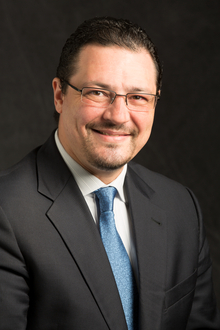Q&A with Doctor of Ministry Program Director Kleber Gonçalves
 The Seventh-day Adventist Theological Seminary’s Doctor of Ministry (DMin) program was the first accredited doctoral degree offered at Andrews University and the first of its kind in the state of Michigan. With almost 800 graduates, many of whom serve in top leadership positions in the Adventist church, the DMin program, in Dr. Kleber Gonçalves’s words, “fulfills the mission and vision of the Seminary and the Adventist church in a practical way.”
The Seventh-day Adventist Theological Seminary’s Doctor of Ministry (DMin) program was the first accredited doctoral degree offered at Andrews University and the first of its kind in the state of Michigan. With almost 800 graduates, many of whom serve in top leadership positions in the Adventist church, the DMin program, in Dr. Kleber Gonçalves’s words, “fulfills the mission and vision of the Seminary and the Adventist church in a practical way.”
What attracted you to the Seventh-day Adventist Theological Seminary?
I’ve always had a dream to share with others from the classroom, because I believe that the places in the church that you can really help change young people’s minds and hearts are in local churches and the classroom. So I prayed that one day, the Lord would give me this chance, and suddenly, the opportunity came. I believe I got the call to come to the Seminary because of what I was doing with the Center for Secular and Postmodern Studies (CSPS) for the General Conference (GC) of Seventh-Day Adventists. The Seminary was looking for someone who had academic credentials, but at the same time, pastoral experience and vision.
Tell us about your experience as a church planter in Brazil.
When I began as a Seminary student in 1996, I had a dream to plant a church in downtown São Paulo, Brazil. The Adventist church had not been able to plant a church in that area, which is composed of around 3.5 million people, for 47 years. When we returned to Brazil, we started a church in São Paulo with 16 people in 2005, and it’s been a long and wonderful journey. I pastored this church for over 10 years and today we have an attendance of around 1400 people, with four services on Sabbath and 30+ ministries, including weekly broadcasting. The GC heard about this church and invited me to come on board as the director for CSPS. I now direct the center from here at Andrews, while at the same time teaching.
How does your dual role impact your leadership of the DMin program?
Both in the classroom and for the GC, I get to teach about things I’ve actually done. When I talk about discipleship or urban missions, it is not something that I’ve read; it is something that I’ve lived. For me, teaching here and continuing to work for the GC is crucial because the church is very dynamic. I’m constantly getting in touch with people in church plants, and can stay in the forefront of the knowledge and the changes in the church. Even though it would be easier to have just one position and stay in one place, getting to do both keeps me in touch and keeps the program relevant.
Why should ministers who are working full-time in the field take this degree?
Our students are seasoned pastors with at least three years of experience in the field, beyond the MDiv. As a result, the classroom experience is more than just a cognitive exercise; it is who they are. Their years of experience combined with the ability to focus on one specific area of ministry equips them to truly serve more effectively in the local church, while helping them achieve the highest possible degree in ministry.
We also have a very financially competitive program, compared to other seminaries, because of the subsidy that we receive from the North American Division, which we are very grateful for. So students can come and receive a competitive price to do their doctoral degree.
What are the new concentrations available to DMin students?
Our new concentrations are: Leading for Growth and Church Multiplication, Multiethnic and Multicultural Ministries, and Leadership in Spanish. Next year, we plan to have a third Spanish concentration in Discipleship or Family Ministries. We also envision concentrations in Life Coaching and Women’s Ministries.
Why are new concentrations always being developed?
The church is very dynamic, so what we were offering 10 years ago may not be so relevant and meaningful today. When we learn that there are other needs that need to be addressed at a deeper level, we work to open a concentration for it. That’s how the program stays relevant, current and practical.

